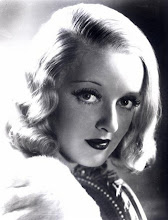Guess Who's Coming To Dinner has, at least on the surface, a very simple plot. However, befitting the movie's main theme, one must look below the surface to truly appreciate the film.
The central theme of the movie is very clear. Race relations was and continues to be an important social issue, and this movie gives a sensitive and realistic portrayal of one such conflict. Though interracial marriage is no longer the taboo (or crime, in some places, as one of Matt Drayton's arguments went) that it was in the 1960's, the private reactions of both John's and Joey's parents are just as applicable today. In fact, I found it almost eerie how modern this 40-year-old film really is; the quote I used as the title of this post, for example, makes it almost too perfect to watch today, the day that the son of a black man and white woman (exactly the interracial pairing being depicted) was in fact sworn in as President of the United States.
Because that part of the movie is so powerful it may be easy to overlook the plot's other aspects, but something else caught my eye. The relationship between parents and children is also a very important theme, although the struggle between the couple and their parents seems secondary to the conflict the parents are experiencing within themselves, but I found Joey's relationship with her family and John's relationship with his to be very compelling.
What first caught my attention was the scene when John and his father speak privately in Matt's office. Mr. Prentice argues that after all he sacrificed for John's well-being, John owes him respect and obedience. John counters that his father was required to provide for him every opportunity that he could, and that he is owed nothing in repayment for doing his parental duties. What struck me about this conversation was how clearly I could understand and even agree with both sides. The problem, and it is a common problem that plagues all kinds of relationships between all kinds of people, is that both Mr. Prentice and the younger Prentice take the most extreme viewpoints on their respective sides of the argument, rendering them each incapable of seeing the other's point of view. It's especially interesting to examine this type of conflict against the background of the racial tension in the film, in which each person takes a far more complex position that results in a difficulty understanding themselves as well as each other.
Mr. Prentice did work hard and sacrifice to give his son every possible chance at success, and I found John's ingratitude appalling. However, there is a point at which parents lose the right to dictate their children's decisions, and that point comes long before the child reaches age 37. At the same time, although I firmly believe that parents owe their children nothing less than the best shot at a good life that the parent can provide, they also deserve respect for carrying out that arduous duty. Respect does not mean living your life according to your parents' terms, but it does require keeping a civil tongue even when disagreeing with them. When John told his father to "Shut up," I cringed -- and come to think of it, I felt similarly when Matt uttered the same expression to Joey, although in that case it was played in a humorous light. I wasn't quite uncomfortable the second time, however, because overall the relationship between Joey and her father had been one of mutual respect throughout the film. That element was certainly missing from John's relationship with his dad.
Although the movie revolved around an interracial relationship, I thought that this side point added an interesting commentary on the nature of relationships in general, whether romantic, parental, platonic, or whathaveyou. It's just one more way that this amazing film continues to be very much relevant today, and one more reason why it's such a classic.
Subscribe to:
Post Comments (Atom)



No comments:
Post a Comment